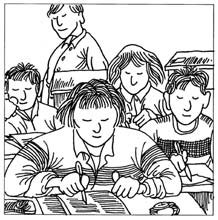 While this year's national college entrance examination starts today, the Ministry of Education is considering introducing a new set of scores as an "important reference" for college enrollment. While this year's national college entrance examination starts today, the Ministry of Education is considering introducing a new set of scores as an "important reference" for college enrollment.
The new scores will mainly come from test results of physical exercises. The education ministry has not specified when the new sports scheme will take effect nationwide. However, junior middle school graduates in Beijing have already gone through tougher sports training over the past few months than their predecessors. The local education authority has increased the ratio of sports tests to academic testing in the competition for senior high school enrollment from 0.5 percent to 0.8 starting this year. Both the national and local education authorities have good reason to place more emphasis on physical exercise. However, arbitrarily adding test tallies to competition scores may not help boost the overall health of Chinese teenagers. Instead, it will place students with disabilities at increasing disadvantage and create more obstacles for them to enter good universities. True enough, monitoring over the years has shown that, although Chinese students are taller than before, many more suffer from near-sightedness or overweight. The latest survey found that one-fourth of teenage boys in urban centers are overweight. Among other physical indicators, many of today's teenagers cannot lift as much weight as their predecessors 20 years ago. As a result, education ministry officials are pushed to seek a new scheme, believing that will stop the continuous decline in teenagers' physical well-being. However, this may not be an effective remedy as the authorities forget the crux of the problem is the skewed test system that puts students under undue pressure in both school and at home. It is not that teenagers don't like physical exercise, especially in the form of sports. I know of quite a few middle school students who love soccer or basketball, but they are deprived of the opportunity to play because their teachers ask them to give up sports for academic work. Sports test scores will only force teenagers to exercise for the sake of tests and will not help with their bodybuilding in the long-run. The percentage of near-sighted students actually increases with the years of schooling. For instance, according to the same national survey of young people's health, 60 percent of junior middle school students, 76 percent of senior middle school students and 83 percent of college undergraduates are near-sighted. Meanwhile, the additional sports test scores will put physically incapacitated teenagers farther behind the starting line to compete for colleges, especially prestigious universities. These youngsters have to overcome many difficulties to pursue their academic goals in an education system that still in many ways discriminates against them. Beijing Youth Daily reported earlier this year that applicants with congenital diseases still have limited chances to enter good colleges. This is so inspite of the fact that the education and health ministries have revised health criteria for national college enrollment to include applicants with handicaps and congenital diseases not requiring surgery. "No college or university wants to go to the trouble of facilitating their admission. It has enough other applicants," a teacher said. Indiscriminately adding sports test scores would only deepen the disparity in college education opportunities between the disabled and their physically fit peers. E-mail: lixing@chinadaily.com.cn (China Daily 06/07/2007 page10)
|

